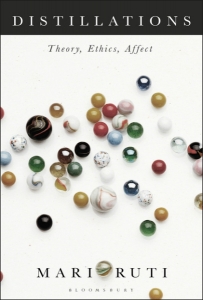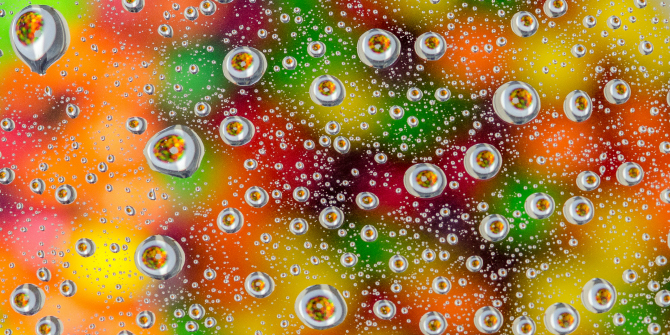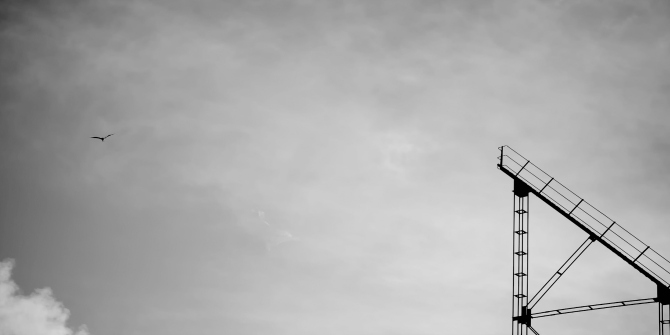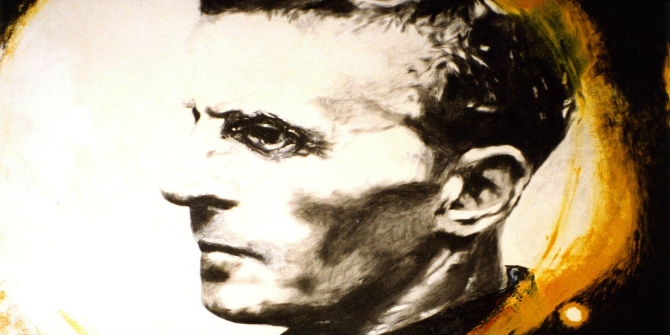In Distillations: Theory, Ethics, Affect, Mari Ruti offers a number of concise formulations – or ‘distillations’ – that reflect on the current state of play in critical theory, with a particular emphasis upon the posthumanist turn and the residing tensions in post-Enlightenment thought. An interesting and challenging book that runs against postmodern shibboleths while remaining in their orbit, this will resonate with those looking to critical theory for its revolutionary potential, writes Adam Woods.
Distillations: Theory, Ethics, Affect. Mari Ruti. Bloomsbury. 2018.
Mari Ruti has been developing these ideas over the span of 11 books, so it is tempting, as she suggests in her introductory remarks, to regard this work as a culmination of sorts. Yet, rather than providing a definitive statement in the form of a systematic account of her theoretical commitments, Ruti has opted for a more modest presentation of her current position. It is interesting that this has taken the form of concise formulations – ‘distillations’, as her title has it – suggesting that she sees herself contributing to a project with more down-to-earth ambitions in comparison with the synoptic theorising of her interlocutors.
Through these distillations, Ruti provides a perspicuous array of reflections on the current state of play in critical theory, posing searching questions about the theoretical and ethical coherence of current accounts. Moving between several theoretical registers and spanning a range of themes, from Lacanian psychoanalysis to affect theory and queer theory, her concerns emanate from her critical engagement with the posthumanist turn in the humanities and the residing tensions in post-Enlightenment thought. She locates aporias and implicit privilege in the work of poststructuralists such as Judith Butler, and covert commitments to white Western male particularity in the universalism of Lacanians such as Slavoj Žižek and Alain Badiou. Those familiar with Rita Felski’s recent work on the limits of critique will find points of interest in the passages that apply psychoanalytic considerations to this theme. But it is in Ruti’s development of a form of Lacanian universalism that while ‘historically specific and open to revision […] nonetheless rem[ains] universally binding’ (1) that we find her most interesting thoughts.
This call to universalism might seem a cause of immediate concern for those committed to difference and particularity. Aren’t we by now well-trained to regard universalist claims with a deep scepticism, to see them as ruses of power? Indeed, it has for some time now been common practice in critical theory to align universalist claims with ideological ploys masking cultural imperialism or inaugurating a covert retrenchment of the status quo. Given these assumptions, it is no wonder that universalism has had a hard time establishing itself as a viable position. But Ruti suggests that this is one of the restrictive hang-ups of post-Enlightenment thought and marks universalism down for a revival. This won’t be painless however, and a trained avoidance of anything that remotely resembles the ghosts of the past has led to a number of theoretical contortions.
So far, the fear of raising the spectres of Enlightenment humanism that theorists have long sought to defeat has led to telling vacillations in poststructuralist thought. Butler is a prime case, and Ruti’s attentive reading of her recent work tracks the misgivings and hesitations she has about her own commitments to a Levinasian form of universalism. Butler’s account is founded upon an ontology that maps the ecstatic constitution of the subject, marking a structural openness that makes it hard to delineate inner from outer. This makes it more conducive to a politics that forefronts vulnerability, and indeed, her account relies upon a generalised account of precarity that raises it to the fundamental ontological condition of human life – a shared fragility, albeit one that is unevenly distributed.
Given that the Levinasian commitment to the face of another reaches the level of an absolute demand, what are we to do in the face of incongruous relations? Are we to greet obstinance with openness? Is there not more than a hint of masochism here? For Ruti, this leaves Butler’s work unsuited to the present conjuncture where examples of displacement and precarity abound. Not only must critical theory be responsive to these circumstances, but it must also nominate paths for resistance and emancipation if it is not to prescind from its critical stance. Its purchase must be measured against its own liberatory relevance to the extensive variety of structural and institutional domination on display in modern society. Yet the valorisation of this precarity seems to actually mesh with the dominant order and therefore unwittingly becomes uncritical in the contexts that decentre the subject anyway. When the very selfhood of precarious subjects is at stake, it is obscene to propose an ethical position that councils the pulverisation of self. As Ruti herself states, we see enough pulverisation sanctioned by the dominant order concretised ‘in the image of splattered blood, muscle, tissue, and bone fragments’ (58), and so you’ll be hard-pushed to pass this as a liberatory mode of comportment.
This sentence hints at a key methodological hinge of Ruti’s approach: her desire to recall us back from theory to the phenomena of the everyday lived experience within prevailing social structures, combining the biological and biographical aspects of our bodily life within these. This is part of her commitment to what she calls ‘liveability’: something that is often conjured away due to theory’s anger at empiricism and its weariness of the quotidian. Ruti’s work displays a lively awareness of the insecurities that arise from such oppressive socio-historical conditions and refuses to avoid the agonistic circumstances that mark out the fractious battleground of the present conjuncture. It is from a sense of commitment but also exasperation that Ruti’s work draws her second chapter, one that adds to Felski’s contribution and might also be taken as her answer to Bruno Latour’s pointed question: ‘why has critique run out of steam?’
Here, she identifies a number of forms that this takes, but the main culprit is ‘the regular and ritual slaying of the sovereign humanist subject’ (54). We are, by now, familiar with this subject who is represented as the master of his own home and the beginning and end of his own thought, enclosed and self-sufficient. The paradigm cases are the bullying cogito that reduces the sensorium of the body to the vanishing point of pure consciousness, and the monadic self-legislator sometimes attributed to Kantian thought. This is something like modern philosophy’s immaculate misconception, which demands us to ignore the role of corporeal-affective dimensions in our accounts of rationality and subject-formation. Of course, there are powerful social, economic and psychological forces that laud sovereignty and feed the illusion of sharply-bounded selves. But Ruti’s question is this: does anyone actually think of themselves in this way, as entirely separate and distinct from their social field and their environment? In Ruti’s hands, this comes to seem the deep roots of a shallow problem as she diagnoses the pathological aspects of critical theory that crystallise around a non-existent object.
Jean-Paul Sartre once made a useful distinction between rebels and revolutionaries. Rebels, he said, keep the world the same in order to go on rebelling against it; revolutionaries look to fulfil Karl Marx’s famous adage and fundamentally change it. It could be said that much of Ruti’s impatience is with the endless rebellion that leaves theory in a state of repetition-compulsion. When we end up on this route, we know in advance where we’re going to end up: in a position that treats this sovereigntist illusion as an intractable problem and thereby blocks the revolutionary potential that critical theory holds as an ideal. Ruti’s escape route from this fixed destiny is tied up with her Lacanian account of subjecthood and her modification of Badiou’s account of the rupture.
Much recent theoretical work has focused on accounts of subjecthood as plural, differentiated, conflicted. Of course, this is easy for Lacanians such as Ruti to accept. For them, the subject is fundamentally divided, emerging through speech only to lose themselves in language. This lack in being is constitutive of subjectivity. The Lacanian cure to this is the acceptance that there is no cure, of the fact that this leads us to continually reach out knowing in advance that this is tinged with the very lack that marks our being. That this lack can be the source of universalist claims is the contribution I find most interesting. A good example is Ruti’s account of penis envy – one that, as she acknowledges, coheres with Sianne Ngai’s – that throws this bad feeling back upon the dominant order from a marginalised position that recognises this not as a deficiency in female anatomy, but ‘as a protest against exasperatingly unequal gender relations’ (204). Such lacks will be present within any historical conjuncture, as will the suffering that they engender. But treating the lack as a source of universalist claims ensures that whatever the status quo may be, it will always be at risk of a rupture that will undo the current dispensation of social goods.
This is an interesting and challenging book. Ruti runs against postmodern shibboleths while remaining within their orbit, and so Distillations is a work that inhabits the borderlands. But there is hybridity to her account seen in her integration of humanist considerations (reason, agency, autonomy) into a posthumanist repertoire. As Ruti acknowledges, this leaves her in a difficult position, one that risks rendering her unintelligible to the poststructuralist thought in which she was schooled. But it is to her credit that the force and lucidity of these distillations open up points of contact within critical theory, while putting forward a strong challenge to those who would repeat the habitual rat-runs that have become by now so familiar. My sense is that Ruti’s work will resonate with those who, like myself, look to critical theory for its revolutionary potential to remake the world before our eyes and map out realistic avenues for liberation.
Adam Woods is a PhD student at the University of East Anglia. His research focuses on applying Wittgenstein’s philosophy to a second-personal consideration of relationality. He doesn’t tweet from @adamianwoods.
Note: This review gives the views of the author, and not the position of the LSE Review of Books blog, or of the London School of Economics.
Image Credit: (Gabe Kronisch CC BY 2.O).


 Find this book:
Find this book: 





